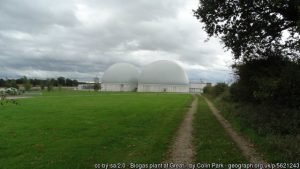 In this article, we list and describe the many “Ways to Make Money from Farm Biogas Plants“.
In this article, we list and describe the many “Ways to Make Money from Farm Biogas Plants“.
The remarkable thing about anaerobic digestion (AD) plants, also known as biogas plants, and as “digesters”, is the number of ways they can create an income, and make money, for their owners.
We think that many people fail to appreciate the potential for money making business diversification, and profit, which on-farm biogas digesters can provide.
Post Covid Pandemic and Energy Price Rise Update
Since global energy demand began to rise again in 2021 the price of natural gas and electricity in most countries has risen in accordance with the global energy market up to triple the previous prices.
At the current level of cost for non-renewable fuels, it is very easy to make money from a biogas plant. Subsidies are not needed.
Not only is there a viable income from electricity output, but the digestate output is now also sought after, when previously it may have been hard to dispose of. With traditional mineral-based fertilisers now up in price from £200/t to £300/t GBP to over £1,000/t AD plant output as a natural fertiliser may now easily be sold to local farmers.
There is no question about it Farm Biogas is now profitable. Although the ability to make money does improve for the larger farms, dairy farms starting in size at no more than 100 cows may now be profitable in the UK.
The following list of income streams can contribute to the economics of individual farm digester projects.
Some apply to making money from Farm Biogas Plants at all digester installations, while others are a matter of choice, or determined by the size or location, of the farm.
Some may not be possible for certain waste types, and as this list is for the United Kingdom, some of these income streams may not be available in your country.
The ways in which financial benefit is possible, fall essentially into two categories.
List 1. Income Created from the By-products of Anaerobic Digestion
First, there are the savings or direct income created by the by-products, including:
1) savings, on the cost of artificial fertilisers for the farm itself, when a farm uses its own digestate as a fertiliser on their own land
2) sales of digested materials, for use as fertiliser, by other nearby farms
3) sale of fibre or finished compost, either through a regional marketing organisation or by distribution locally
4) savings in on-farm energy costs, through the use of gas for heating and cooking
5) the sale of electricity, or biogas, either locally or through the national grids, and
6) the sale of spare heat, from CHP units for use in heating buildings or greenhouses, for example.
List 2. Income Created from Payments and Subsidies for Reducing Environmental Problems
Second, to make money from Farm Biogas Plants, there are payments and subsidies, of one kind or another, for reducing environmental problems which affect the whole community.
These payments could include:
1) gate fees for processing other organic wastes, such as source-separated domestic food waste
or garden waste or possibly sludge from small sewage works
2) incentives for producing renewable energy, either through the Renewable Heat Initiative (the UK scheme was closed in 2022) or Feed-in-Tariffs, (also known as FiTs), for electricity generation, and
3) payments for overall reductions in greenhouse gas emissions
4) sometimes there may even be payments made by governments to encourage farmers to use anaerobic digestion as a way to reduce the burden of farmyard contamination on local watercourses, in areas of intensive dairy farming.
In the next section we explain how this was done in order to clean up bathing beaches on the Solway Firth in the UK in the 1990s:
Anaerobic Digestion Cleans Up Bathing Beaches
In the early 2000s there were even AD project grants given to some farmers close to bathing beaches in Scotland’s Solway Firth, so that biogas plants were built in an area where dairy farmyard, summer storm-water slurry run-off, was jeopardising the tourist industry.
On those local beaches, EU bathing beach water quality in the period after heavy summer storms was significantly improved, by installing anaerobic digestion plants.

Conclusion to this article on “Ways to Make Money from Farm Biogas Plants”
Our conclusion is that you can improve the chances you'll make money from Farm Biogas Plants, by the following:
It is worth the effort to conduct a pre-feasibility study to determine the cost, revenues, and viability of your biogas project, depending on the site-specific features of your farm or food processing company. To learn more about a feasibility study to determine whether your farm or food processing company has a good potential for developing a biogas generator from food waste or organic waste, please contact us at IPPTS Associates.
Establishing effective ways of using all the by-products of a biogas plant, and marketing them in the best manner for maximised income, can raise the income from biogas plants substantially.
A number of forms of government funding (subsidies) are available to help ensure robust economic viability for not only farm biogas plants, but also community biogas projects, and municipal waste-collection authority involvement in the industry.
Governments have been subsidising biogas production, but generally, they need to focus the provision of this money more directly on the environmental benefits of each AD Facility.
By doing that, the contribution of public funds can be best used, to help encourage the use of the biogas process in ways which meet the needs of small, as well as larger farms.
In particular, it is important to bring together as many as possible of these income streams, for each anaerobic digestion plant.
The good news is that, if this is done, many more farmers, on many more farms, should be able to find it possible to profitably install many more biogas digesters.
Thank you for watching our video presentation (above), and reading this article, we hope you found it useful.
You may like to also watch our video on how to raise biogas yield, as another way to improve the income from existing anaerobic digestion plants.
The Guardian Newspaper had the following to say about the ways to make money from farm biogas plants:
“Waste processing isn’t the sexiest of industries, but it’s crucial to combating climate change. Now governments are investing in technologies like anaerobic digestion.
New anaerobic digestion systems are helping farmers solve multiple problems, including reducing smells from farms.
The smell of manure is not enticing. Indeed, waste of whatever description is something we tend to avoid thinking about. But as the adage goes: “where there’s muck there’s brass”, and so it is that businesses have always been drawn to this less than salubrious arena to earn money.
Now a new generation of entrepreneurs has plans to alter the way we deal with waste. Using new technologies and techniques, they have uncovered ways to convert it into energy and more efficient fertiliser, reduce methane emissions and pollution, cut bad smells and, as one entrepreneur puts it, “turn muck into money”. via Turning muck into money: the biogas revolution takes off …”
[Article first published January 2017. Updated July 2024.]





Great, thanks for making public the story in this article. Really thank you!
Awesome. Make money from this biogas. Make money on cars. Any car bought. Do car deals, stash the cash!
which is best. tell the best way to do this. we want to do this with our local bio-waste. tell how to do.
Nice to see this site develop. Opinions hard to find elsewhere. But, don’t focus on the hard money. Consider the diversification benefits of doing something which will be more circular in you farm using the waste products. This is imprtant.
One of the challenges we are facing in Africa as biogas practitioner is coming up with stand alone biogas plant that can generate electricity for rural setups, understanding the economics of putting up this sort of technology. In our case we have tried and we are still trying to for source investment to put up a prototype here in Zambia.
We have tried to identify potential finances in EU- NORDIC financiers but our colleagues in Finland( biogas technology developers) are reluctant siting cumbersome project proposal writing and length period of time it takes for projects to be financed. Our hope to find a an EU based company that partner with us to develop and to install a commercial biogas plant here in Zambia. Is their any one here link us to such companies?